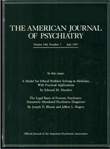The traumatic aftereffects of collision at sea
Abstract
To determine the psychological effects of a maritime collision, the authors compared the performance and health of the officers and crews of the USS Belknap (N = 336) and the USS Yarnell (N = 387) during the 3 years after the Belknap's collision. Significantly more of the Belknap members were hospitalized or separated from service because of neuroses, and the men who had the highest percentage of psychiatric hospitalizations were the uninjured men who were evacuated, returned to the ship, then flown to the United States. Future disaster studies should evaluate the effectiveness of crisis intervention in reducing long-term psychological impairment.
Access content
To read the fulltext, please use one of the options below to sign in or purchase access.- Personal login
- Institutional Login
- Sign in via OpenAthens
- Register for access
-
Please login/register if you wish to pair your device and check access availability.
Not a subscriber?
PsychiatryOnline subscription options offer access to the DSM-5 library, books, journals, CME, and patient resources. This all-in-one virtual library provides psychiatrists and mental health professionals with key resources for diagnosis, treatment, research, and professional development.
Need more help? PsychiatryOnline Customer Service may be reached by emailing [email protected] or by calling 800-368-5777 (in the U.S.) or 703-907-7322 (outside the U.S.).



